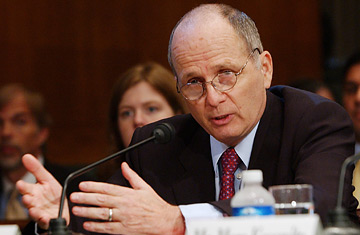
Former Security and Exchange Commission investigator Gary Aguirre testifies on Capitol Hill in 2006
(2 of 2)
Almost two years after being fired, Aguirre won some measure of vindication in the Congressional report. "Our investigation has uncovered real failures at the SEC, and fixing those problems will take real reforms," said Senator Charles Grassley when he introduced the executive summary into the Congressional record on August 3. Among other conclusions, Grassley said the report found that Aguirre's firing was "closely connected" to his objections to the "special treatment" afforded to John Mack. Grassley complained that "Mack's prominence protected him from the initial SEC inquiry, protection that would not have been afforded him had he been from Main Street rather than Wall Street." The Senator also lambasted the SEC's inspector general for having made "no attempt to conduct a serious, credible investigation" of Aguirre's allegations. Rather than a critical mechanism for airing staff concerns, the report argues, the IG is regarded by some as "a tool of management, used for retaliatory investigations against disfavored staff."
Some securities lawyers, as well as SEC veterans, view the report as deeply flawed. "I have never seen any situation or instance where somebody has made a judgment based on the who, and the influence, and the power; I don't think that's the way they make judgments," argues William McLucas, a 20-year SEC veteran, and former enforcement division chief, who now works for the prominent D.C. law firm WilmerHale.
Lynn Turner, a former SEC chief accountant, considers the SEC one of the great governmental agencies but applauds the "excellent" report for highlighting its numerous flaws. "These investigators really lay out for the public what really happens on Wall Street and how the securities defense bar protects them," says Turner, referring to what he says is rampant insider trading. "This could have been a blockbuster case, it gets at the heart of what is the problem with Wall Street hedge funds." Of particular concern to Turner and others is that Congress continues to "bleed" the SEC of staff and resources, overwhelming its ability to keep pace with the expanding and increasingly sophisticated markets.
The current SEC chairman, Christopher Cox, has welcomed the report and has promised to follow up on implementing its key recommendations, including composing a comprehensive procedural investigative manual, similar to one used by U.S. Attorneys, to minimize discretionary abuse. Another recommendation: to keep reliable records of all external communication and to "generally discourage" communication with supervisors that excludes lead staff attorneys. Grassley praised Cox, a former Congressman, as a "model of transparency and accountability" and for "recognizing the value of Congressional oversight instead of resisting it like most other agencies do." As for the inspector general's office at the SEC, change is already happening; Walter Stachnik, the only inspector general that SEC has ever had since the post was created in 1989, quietly retired the same day the Senate report came out.
For his part, Aguirre has returned to San Diego, where he is still appealing his dismissal and suing the SEC for more documents. He also continues to call for heads to roll, but insists this is not about getting even but bucking up the agency he once revered, and still would like to rejoin.
In reporting the allegations of Gary Aguirre's superiors at the SEC, the original article should have made it clear that the accusations had been discredited by the two Senate committees that jointly issued their report after conducting an exhaustive, year long investigation, which included questioning of all his superiors. "When combined with the circumstances reviewed earlier, the termination appears to be merely the culmination of the process of reprisal that began with the August 1 re-evaluation," the report reads. "Thus, in its totality, the evidence we reviewed suggests a retaliatory motive for Aguirre's dismissal."
